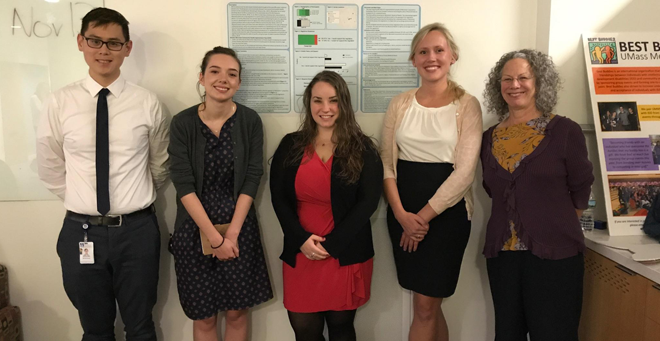 |
|
|
(from left) Population health clerkship students Kevin Gao, Grace Hewett, Angelina Coco and Meghan Chenausky, with advisor Tina Grosowsky, will present their flavored tobacco survey findings to the Worcester Board of Health on Monday, Dec. 4. |
A survey conducted by UMass Medical School students found that 86 percent of Worcester adults surveyed—including 72 percent of those surveyed who smoke—believe flavored tobacco products should be sold exclusively by adult-only establishments. The students will present their findings at the Worcester Board of Health on Monday, Dec. 4.
MD/PhD student Kevin Gao, medical student Grace Hewett and nursing students Meghan Chenausky and Angelina Coco surveyed a representative sample of Worcester residents about their views on the sale of flavored tobacco products such as small flavored cigars and e-cigarettes in stores frequented by people under 21. Restricting those products to age 21-plus establishments has been shown to decrease the sale of flavored tobacco products among adults and youths and significantly decrease the odds of youths using any type of tobacco product.
“Gathering the survey data and preparing it for future presentation to the Worcester Board of Health allowed me to glimpse how physicians and medical students can directly impact change in the communities they serve,” said Hewett, SOM ’20. “By impacting a public health issue such as smoking cessation, even in a small way, I can support the wellbeing of my future patients by being their advocate.”
Overall, “tobacco is unhealthy” and “concern for youth well-being” were the most common reasons survey respondents support the flavored tobacco restriction regulation. Many of the smokers surveyed shared their personal struggles with tobacco addiction, providing compelling evidence for the Worcester Board of Health.
“In working with cessation experts, policy makers and community members facing tobacco addiction, I've learned so much about the struggles, guilt and troubled relationship many have with nicotine,” said Gao. He has seen this among his own peers. “Many who want to quit smoking have switched to vaping as harm reduction. Instead, using flavored products have intensified their nicotine addictions.”
Currently, 105 Massachusetts municipalities, including 25 cities, have adopted some or all of the Massachusetts Department of Public Health’s Draft Model Youth Access to Tobacco Regulation, which advises municipalities to enact restrictions. These include raising the tobacco sales age to 21, banning sales of all tobacco products in pharmacies and restricting flavored tobacco sales to adult-only establishments.
“Municipalities can pick and choose and enact regulations one at a time, which Worcester has done with raising the sales age to 21 and banning tobacco sales at pharmacies,” said Tina Grosowsky, project coordinator for the Central Massachusetts Tobacco-Free Community Partnership and advisor for the population health clerkship. “We would like the city to get in line with the many communities across Massachusetts that have already enacted flavored tobacco restrictions, including many of those surrounding Worcester. We take a contiguous approach to get close-together towns on board, making retailers’ objection that customers will take their business elsewhere less robust.”
The lesson that student took away is that the tobacco addiction paradigm must shift from treatment to prevention, and that regulation is a large part of prevention.
“I learned the importance of having a political voice as a health care provider, and that an individual or small group of people, such as our clerkship group, can tangibly influence local policy change,” said Chenausky. “As a future primary care provider, it will be immensely beneficial to my patients and me to understand tobacco addiction both clinically and politically. I look forward to continuing to be an advocate using both political action and clinical practice to combat tobacco addiction in my community.”
The Central Massachusetts Tobacco-Free Partnership is a program of the UMMS Department of Psychiatry that is funded by the Massachusetts Department of Public Health. The partnership supports policy change at the local level, particularly raising awareness of how the tobacco industry appeals to youth with e-cigarettes, vaping and flavored tobacco products.
“This was a great partnership that was strategically designed to advance policy goals,” said Grosowsky. “We showed that a simple survey process can yield important data about community norms that are valuable in educating municipal leaders and citizens about tobacco policy.”
Related stories on UMassMedNow:
Brain imaging study finds link between menthol tobacco, nicotine addiction
UMMS public health expert lauds success of cigar sales restrictions
UMMS tobacco prevention experts encouraged by FDA regulations on e-cigarettes
New study by UMMS shows Boston has reduced youth access to flavored cigars